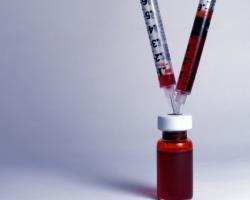Should You Use Blood Tests to Detect Anorexia?
 Diagnosing anorexia involves the consideration of many different factors.
Diagnosing anorexia involves the consideration of many different factors.
All areas of health – physical, psychological, emotional – must be evaluated in order to arrive at a proper diagnosis.
Blood tests can be helpful when assessing the physical state of the patient, especially for the purposes of getting the individual immediate medical attention if there are serious health problems present.
Common lab tests
The types of lab tests may vary depending on the decisions of your doctor, but could include: a complete blood count (CBC), which measures white and red blood cell count; a comprehensive metabolic panel, which assesses the state of the kidneys, liver and blood sugar; a liver panel, which tests for liver enzyme levels; or a lipid profile, which counts cholesterol and triglyceride levels.
If routine tests do not give your physician enough information, more tests may be ordered.
Psychological evaluation
The health of your blood may tell part of the story when it comes to anorexia, but your doctor will probably also recommend that you undergo a psychological evaluation as well.
Anorexia is considered a mental health disorder, which means treatment will include not just nutritional or medical therapies, but also psychological therapies.
Other considerations
It should be noted that anorexia is not something that can be simply “detected” with blood tests. A physician must look at the total picture of your health to make a diagnosis – and he or she must take into account medical diagnostic criteria.
In some cases, symptoms of anorexia may indicate some other type of mental health or physical problem – in which case your doctor may want to perform a full physical exam, test your heart for irregularities or send you to get X-rays to check your bone density.
If anorexia is indicated, blood work will help reveal what nutritional deficiencies or medical issues may need to be addressed in order to put you on the path to recovery.
Source: Mayo Clinic, Maudsley Parents
 Eating Disorder Self Test. Take the EAT-26 self test to see if you might have eating disorder symptoms that might require professional evaluation. All answers are confidential.
Eating Disorder Self Test. Take the EAT-26 self test to see if you might have eating disorder symptoms that might require professional evaluation. All answers are confidential.